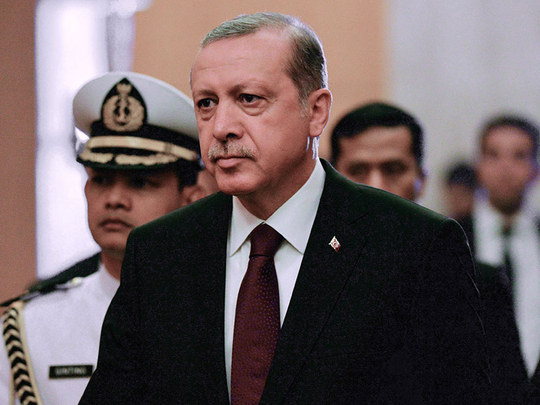
By opening up its Incirlik Air Base after long last to be used for combat operations by the United States against targets in Syria belonging to Daesh (the self-proclaimed Islamic State of Iraq and Levant), Turkey is opening a new venue to re-assert its regional role and to rebuild its Atlantic relations. On the one hand, this decision could prove crucial in the long fight against Daesh forces but it could equally prove vital in the Turkish President Recep Tayyip Erdogan’s fight to re-instate himself in the struggle ahead to regain his political fortunes as the undisputed leader in his country.
Incirlik, home of the 39th Air Base Wing of the US Air Force, is strategically an important component to any serious attempt to rid the region of Daesh and put an end to its activities inside Syria and Iraq. It has been shared between Turkey and the US since 1954 as the base proved widely crucial for the US and its allies in both Afghanistan and Iraq wars. Conveniently situated, it is one of the largest and closest Nato bases to northern Syria and war strategists believe it will shorten flight times and fuel costs for anti-Daesh air strikes whenever they happen.
But why didn’t Turkey’s Erdogan do this sooner? Until the end of July, Turkey resisted getting involved in the fight against Daesh. In fact, its aid to the Syrian rebels of the ‘Free Army’ has always fallen short since the Arab Spring early in 2011. But now, the realities on the ground have changed after two major developments: Domestically, the terrorist attack in the Turkish town, Suruc, bordering northern Syria, and internationally, the nuclear deal between Iran and the five permanent Security Council members plus Germany. Understandably, Erdogan’s government is accusing Daesh for the latest criminal bombing in southern Turkey that killed 32 innocent civilians and wounded hundreds others. Turkey now says it is fully committed to what it described as ‘decisive action’ against Daesh terror, but it is also taking advantage of the situation to hit Kurdish targets. This attack in Suruc has obviously changed the dynamics of both Turkey’s domestic and foreign policies where Erdogan’s Justice and Development Party (AKP) believes, if rightly handled, it can regain the leading role it had lost after the last general election.
What really matters for the AKP in the immediate term is not necessarily the fight against Daesh inside Syria, but more importantly curbing the rising Kurdish power of the Peoples’ Democratic Party (HDP) inside Turkey as well as that of the Kurdish Workers Party (PKK) inside Syria. Erdogan’s government is waging war against PKK behind the facade of the war against Daesh. With this two tracks’ plan, Erdogan is trying re-assert his political position in the country after the setback in the election. He is challenging the newly elected Kurdish HDP to choose between risking 13 per cent of the national votes if it sides with the PKK, as well as making it more difficult for the nationalist Republican People’s Party (CHP) to make progress in any potential coalition with HDP. These two parties, if they stick together, would clearly represent formidable opposition against attempts by AKP to form a solid-based government.
The Iran factor
Now with Iran restoring its normal relations practically with the world following the nuclear deal, the regional and international dynamics have also drastically changed. This puts Iran far ahead any regional power in the Middle East and the neighbouring areas, including Turkey of course, both economically and politically. With its huge untapped resources after decades of international boycott, the nuclear deal has brought the Islamic Republic closer to the US and the exceptionally large European Union market. Iran’s potential powers, if wisely used by its ruling, and sometimes contradicting entities with its existing energy assets, will eventually put the country in a position that will enable it to have its say in developments not only in the Middle East, but also in the Caucasus as well as in Central Asia. In another word, the deal is potentially expected to make Iran more active and more welcomed player on the international scene. Turkey, under the new circumstances, should be naturally anxious about its influence in such a situation as it would be expected to be part of the new game and take its place on the table as the cards will soon be reshuffled with new roles distributed among the various players in the region.
Already many Turkish business giants have expressed their pleasure at the potential that the nuclear deal would be providing as a result of Iran’s rejoining the global capital market. The Turkish business community is fully aware that with Iran as the fourth biggest oil and second natural gas reserves in the world, the investment opportunities are obviously unlimited. Unlike Turkey, Iran does not have problems such as a budget deficit. Therefore, global companies and banks are already in line to invest in Iran. It is common knowledge that following the nuclear deal with Iran, the country’s oil production will recover within the decade. Iran’s oil production under the sanctions imposed in 2011 fell from 3.8 million barrels daily to today’s 2.8 million level. Turkey’s most important natural gas supplier is Iran with annual $10 billion (Dh36.7 billion) worth of imports and $4billion worth of Turkish exports. Turkey faced with the new reality that Iran presents to the region, is preparing to change and reconsider its policy in the near future.
Mustapha Karkouti is a former president of the Foreign Press Association, London.










